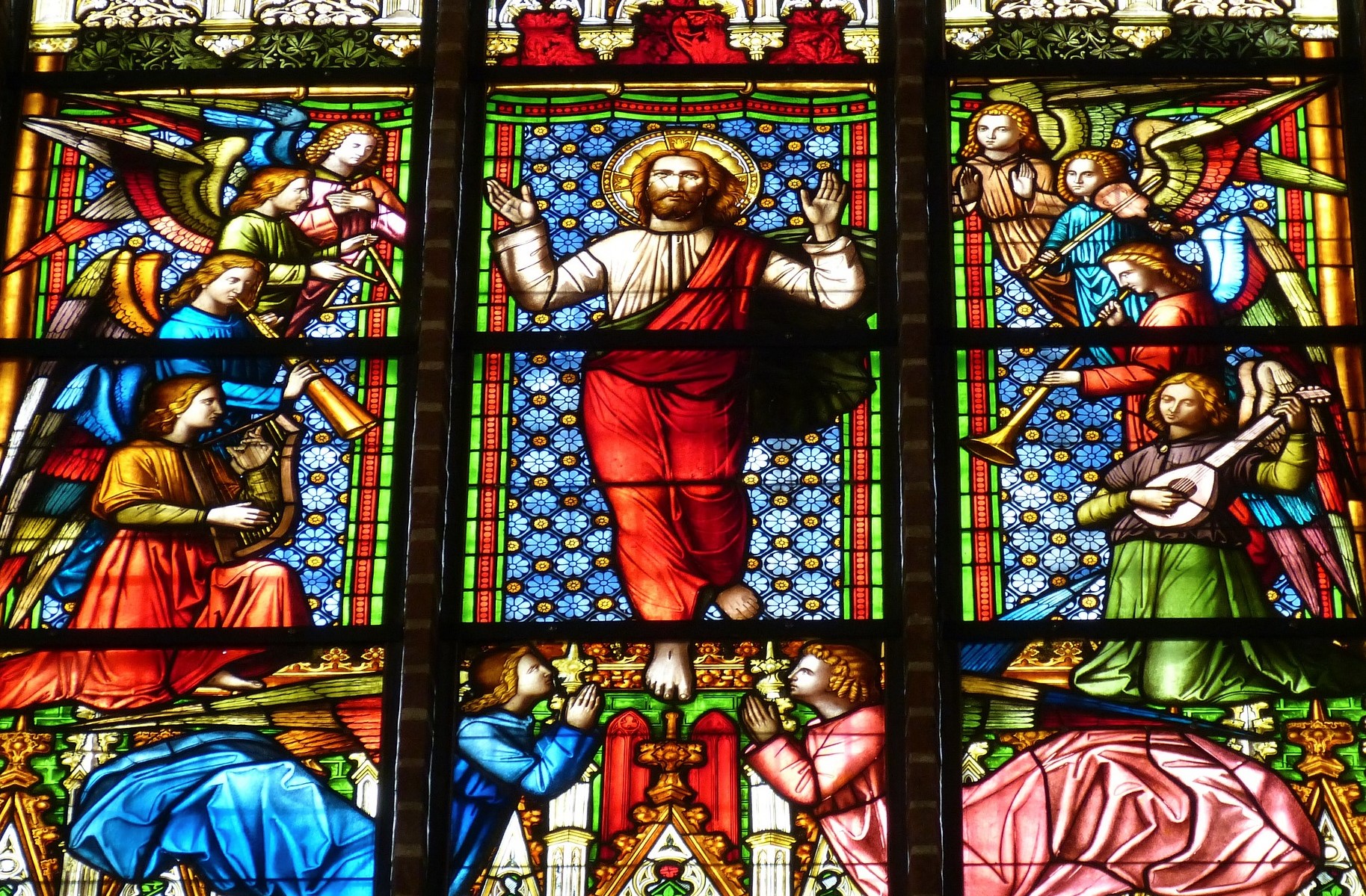We ask you, humbly: don't scroll away.
Hi readers, it seems you use Catholic Online a lot; that's great! It's a little awkward to ask, but we need your help. If you have already donated, we sincerely thank you. We're not salespeople, but we depend on donations averaging $14.76 and fewer than 1% of readers give. If you donate just $5.00, the price of your coffee, Catholic Online School could keep thriving. Thank you.Help Now >
'American Catholic Council', Sensus Fidelium and the Voice of the Truly Faithful
FREE Catholic Classes
When dissenters challenge the Church, we are given an opportunity to study the truth that is being attacked. In a continuing series of articles on this misguided movement, Catholic Online considers the real meaning of sensus fidelium--and reveals a stunning admission by one of the leaders of the American Catholic Council.
Highlights
Catholic Online (https://www.catholic.org)
11/18/2010 (1 decade ago)
Published in U.S.
Keywords: american catholic council, acc, dissent heterodoxy, heresy, faithful, magisterium,
P>GRAND RAPIDS, MI (Catholic Online) - Catholic Online has been reporting about the American Catholic Council (ACC), a dissent group planning a national convention in June of 2011 "in the spirit of Vatican II." Like many such groups, ACC misconstrues-either inadvertently or intentionally-the Church's teaching about sensus fidelium ("sense of the faithful") to justify their agenda.
Article VIII in the ACC "Catholic Bill of Rights and Responsibilities" states: "Every baptized Catholic has a meaningful role to play, through sensus fidelium, in the interpretation of the Gospel, the Church's Tradition, and the Church's structure." One gets the sense here that a baptism certificate becomes an ecclesial voter registration card-that anyone who can merely produce one is entitled to help shape Church doctrine. Nothing could be further from the truth.
Sensus fidelium literally means "sense of the faithful." The term originated with the early Church Fathers, and refers to unerring truth sensed or recognized by the entire body of the faithful-from the Magisterium to the last of the laity, according to St. Augustine. The Dogmatic Constitution on the Church (Lumen Gentium) issued at Vatican II said this about sensus fidelium in section 12:
"The holy people of God shares also in Christ's prophetic office; it spreads abroad a living witness to Him, especially by means of a life of faith and charity and by offering to God a sacrifice of praise, the tribute of lips which give praise to His name (cf. Heb. 13:15). The entire body of the faithful, anointed as they are by the Holy One, (cf. 1 Jn. 2:20, 27) cannot err in matters of belief. They manifest this special property by means of the whole peoples' supernatural discernment in matters of faith when from the Bishops down to the last of the lay faithful they show universal agreement in matters of faith and morals. That discernment in matters of faith is aroused and sustained by the Spirit of truth. It is exercised under the guidance of the sacred teaching authority, in faithful and respectful obedience to which the people of God accepts that which is not just the word of men but truly the word of God (cf. 1 Th. 2:13)."
The Glossary to the Catechism of the Catholic Church gives an abbreviated definition which is helpful: "Sensus Fidei: a supernatural appreciation of the faith (Sensus fidei) shown by the universal consent in matters of faith and morals manifested by the whole body of the faithful under the guidance of the Magisterium." The Magisterium is a gift. The Lord promised He would not leave us orphans (John 14:8) and that the Spirit would guide us into all truth (John 16:13).
We ask you, humbly: don't scroll away.
Hi readers, it seems you use Catholic Online a lot; that's great! It's a little awkward to ask, but we need your help. If you have already donated, we sincerely thank you. We're not salespeople, but we depend on donations averaging $14.76 and fewer than 1% of readers give. If you donate just $5.00, the price of your coffee, Catholic Online School could keep thriving. Thank you.Help Now >
The Catechism again helps us to understand one of the ways in which He fulfills that promise: "The task of giving an authentic interpretation of the Word of God, whether in its written form or in the form of Tradition, has been entrusted to the living teaching office of the Church alone. Its authority in this matter is exercised in the name of Jesus Christ."47 This means that the task of interpretation has been entrusted to the bishops in communion with the successor of Peter, the Bishop of Rome." (CCC, 85)
Foundational to sensus fidelium, of course, is establishing who constitutes "the faithful." Does it refer to all who have been baptized, as ACC suggests, or are there qualifiers among the baptized-denoting some as "the faithful" and others as not? Lumen Gentium's reference to 1 John 2:20, 27 provides a key.
These two verses are from a broader passage (1 John 2:18-27) in which the Apostle distinguishes between dissenters who were once members of the body but have placed themselves in opposition, and those who have remained loyal to the faith given them in baptism. He holds that the anointing of the Spirit is manifested through the latter. Verses 26-27 are to the point: "I write you these things about those who would deceive you. As for you, the anointing that you received from him remains in you, so that you do not need anyone to teach you. But his anointing teaches you about everything and is true and not false; just as it taught you, remain in him."
Obviously there are some baptized who dissent from the authoritative teaching of the Church and others who assent. Lumen Gentium asserts that baptism doesn't automatically ensure that one continues in the company of "the faithful"-there is a responsibility placed upon the baptized to give assent both inwardly and publicly to authoritative teaching. Section 11 declares that "reborn as sons of God, [the baptized] must profess before men the faith they have received from God through the Church."
This responsibility has been reiterated in The Catechism of the Catholic Church: "Having become a member of the Church, the person baptized belongs no longer to himself, but to him who died and rose for us. (cf. 1 Cor. 6:19; 2 Cor. 5:15.) From now on, he is called to be subject to others, to serve them in the communion of the Church, and to obey and submit to the Church's leaders, (cf. Heb. 13:17) holding them in respect and affection. (cf. Eph. 5:21; 1 Cor. 16:15-16; 1 Thess. 5:12-13; Jn. 13:12-15)" [#1269]
Any of the baptized who dissent from the faith of the Church-which Vatican II emphatically reaffirmed as the faith authoritatively taught by the Magisterium-have separated themselves from "the faithful."
ACC operates under the premise that there are "truths" which their leaders recognize but the Magisterium does not. Not only does this reject the Vatican II affirmation of Magisterial teaching as "not just the word of men but truly the word of God," but by logic it would render sensus fidelium impossible to attain. Lumen Gentium dogmatically defined sensus fidelium as applying to "the entire body of the faithful when from the Bishops down to the last of the lay faithful they show universal agreement in matters of faith and morals." Universal agreement among "the faithful" is not possible if "the faithful" includes both those who assent to the Bishops' teaching and those who do not. Under ACC's understanding of sensus fidelium, it would be impossible for this property to even exist.
Concurrently, it is important to understand that sensus fidelium does not mean that universal consent of the faithful is necessary for a doctrine to be true, or that doctrine becomes true by virtue of such consensus. It means that universal consent is possible because the doctrine is true in the first place. Truth emanates from God and comes to the faithful-not the other way around. When the entire body of the faithful recognizes the truth through "supernatural discernment"-not by human reason alone-sensus fidelium becomes the prophetic witness spoken of in Lumen Gentium.
This is what is meant by "The holy people of God shares also in Christ's prophetic office." When the entire body of the faithful agrees with the truth, it is a powerful and prophetic witness to the rest of the world. When "the faithful" is divided, it is a sad and pathetic witness of an institution showing only its human limitations and rejecting its divine identity.
There is evidence the latter perspective exists among the ACC leadership. In an email correspondence with me, one of the members of the ACC national planning committee made a distressing admission. Out of fairness to this person I will protect their anonymity; I did not identify myself as a writer in our correspondence, and this person indicated afterwards that they were speaking on their own behalf, not in the name of ACC. The latter point is irrelevant, as this person does claim to speak for ACC in other venues, and the personal opinion expressed here would discredit anyone who claims to be Catholic from speaking on behalf of the Catholic Church and its ecumenical councils. This ACC leader wrote to me:
"We two clearly have different starting places intellectually when talking about Church structure. For me, it is patently human made-and that is wonderful! We humans are the ones who decide what we proclaim to be 'from God' after all. So, if we mess it up, we have no one to blame other than ourselves."
Vatican II-in whose name the American Catholic Council claims to act-dogmatically reaffirmed the Catholic Church as divinely established by Jesus Christ upon the hierarchical structure of Peter and the Apostles, whose divine authority today's hierarchy of the Pope and Bishops inherit. As long as the American Catholic Council continues to act in the name of the Catholic Church and Vatican II, Catholic Online will continue to expose their errors and educate the faithful about the true Catholic teachings which Vatican II reaffirmed.
_____
James Penrice is an author of nine books, a correspondent for Catholic Athletes for Christ, and a contributor to Catholic Online.
---
'Help Give every Student and Teacher FREE resources for a world-class Moral Catholic Education'
Copyright 2021 - Distributed by Catholic Online
Join the Movement
When you sign up below, you don't just join an email list - you're joining an entire movement for Free world class Catholic education.
-

-
Mysteries of the Rosary
-
St. Faustina Kowalska
-
Litany of the Blessed Virgin Mary
-
Saint of the Day for Wednesday, Oct 4th, 2023
-
Popular Saints
-
St. Francis of Assisi
-
Bible
-
Female / Women Saints
-
7 Morning Prayers you need to get your day started with God
-
Litany of the Blessed Virgin Mary
California Teens Win $1 Million Lawsuit Against Catholic School Over Misinterpreted Blackface ...
-

Why Do We Celebrate the Feast of the Ascension of Jesus? What Does it Mean?
-

Encouraging Scripture for the Single Mom on Mother's Day
-
Three things that should be in every Catholic home - How many do you have?
-
New York Judge Halts Constitutional Amendment on Abortion Due to Procedural Flaws
Daily Catholic
 Daily Readings for Friday, May 10, 2024
Daily Readings for Friday, May 10, 2024 St. Damien of Molokai: Saint of the Day for Friday, May 10, 2024
St. Damien of Molokai: Saint of the Day for Friday, May 10, 2024 Prayer to St. Gabriel, for Others: Prayer of the Day for Friday, May 10, 2024
Prayer to St. Gabriel, for Others: Prayer of the Day for Friday, May 10, 2024- Daily Readings for Thursday, May 09, 2024
- St. Pachomius: Saint of the Day for Thursday, May 09, 2024
- Prayer for Travelers: Prayer of the Day for Thursday, May 09, 2024
 Hi readers, it seems you use Catholic Online a lot; that's great! It's a little awkward to ask, but we need your help. If you have already donated, we sincerely thank you. We're not salespeople, but we depend on donations averaging $14.76 and fewer than 1% of readers give. If you donate just $5.00, the price of your coffee, Catholic Online School could keep thriving. Thank you. Help Now >
Hi readers, it seems you use Catholic Online a lot; that's great! It's a little awkward to ask, but we need your help. If you have already donated, we sincerely thank you. We're not salespeople, but we depend on donations averaging $14.76 and fewer than 1% of readers give. If you donate just $5.00, the price of your coffee, Catholic Online School could keep thriving. Thank you. Help Now >
![]()
Copyright 2024 Catholic Online. All materials contained on this site, whether written, audible or visual are the exclusive property of Catholic Online and are protected under U.S. and International copyright laws, © Copyright 2024 Catholic Online. Any unauthorized use, without prior written consent of Catholic Online is strictly forbidden and prohibited.
Catholic Online is a Project of Your Catholic Voice Foundation, a Not-for-Profit Corporation. Your Catholic Voice Foundation has been granted a recognition of tax exemption under Section 501(c)(3) of the Internal Revenue Code. Federal Tax Identification Number: 81-0596847. Your gift is tax-deductible as allowed by law.









 Daily Readings for Friday, May 10, 2024
Daily Readings for Friday, May 10, 2024 St. Damien of Molokai: Saint of the Day for Friday, May 10, 2024
St. Damien of Molokai: Saint of the Day for Friday, May 10, 2024 Prayer to St. Gabriel, for Others: Prayer of the Day for Friday, May 10, 2024
Prayer to St. Gabriel, for Others: Prayer of the Day for Friday, May 10, 2024
